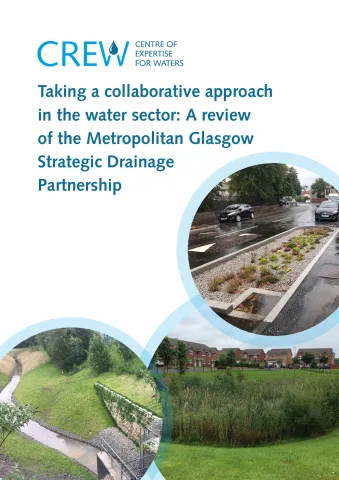The Metropolitan Glasgow Strategic Drainage Partnership (MGSDP) is a non-statutory partnership between public bodies involved in managing surface water, water quality, flood risk, investment planning and economic delivery, with a vision to ‘Sustainably Drain Glasgow’. The MGSDP began following severe flooding in July 2002 in the East End of Glasgow. It was recognised that an integrated strategy to master planning was required to meet the needs of all stakeholders as responsibilities for stormwater management in Scotland are divided between several parties, with conflicting statutory duties and unaligned funding streams making collaboration difficult.
The Partnership vision is to “transform how the city region thinks about, and manages rainfall, to end uncontrolled flooding and improve water quality”. The vision provides a strategic focus and is supported by five objectives and eight guiding principles.
As the MGSDP enters its next phase, now is an ideal time to take stock of the gains made, study its impact, and fully understand how the knowledge gained can be used to address challenges other cities in Scotland face. In the coming decade the scientific, political and public aspirations to mitigate climate change impacts will result in increased demand for investment in adaptive approaches and collaborative working. To support the MGSDP and inform policy developments, the research team reviewed how it has operated to identify the lessons learnt. To deliver this, a literature review was undertaken, consultation data gathered, case studies developed, and recommendations made.
Lessons learnt are considered in the context of both the MGSDP’s future and the development of new partnerships.
Lessons learnt from the MGSDP: (1) A coordinator is required to drive the partnership working process and sustain strong collaborative groups; (2) Knowledge building is crucial to avoid narrow-focussed partnerships and deliver broad agendas; (3) Being open, honest and sharing information builds trust and helps overcome barriers such as lack of equity and misaligned policy/funding cycles.
Lessons learnt for Policy Makers: (1) robust coordination maintains focus on a co-developed vision; (2) Overlapping responsibilities and misaligned funding cycles are challenges to efficient progress; (3) Establishing trust, leads to enhanced problem solving and a willingness to take risks.
| Attachment | Size |
|---|---|
| CRW2019_11 Main Report | 1.35 MB |
| CRW2019_11 Annexes | 4.8 MB |
